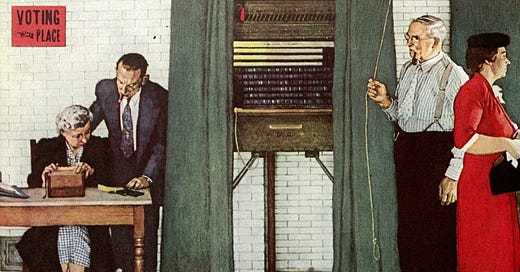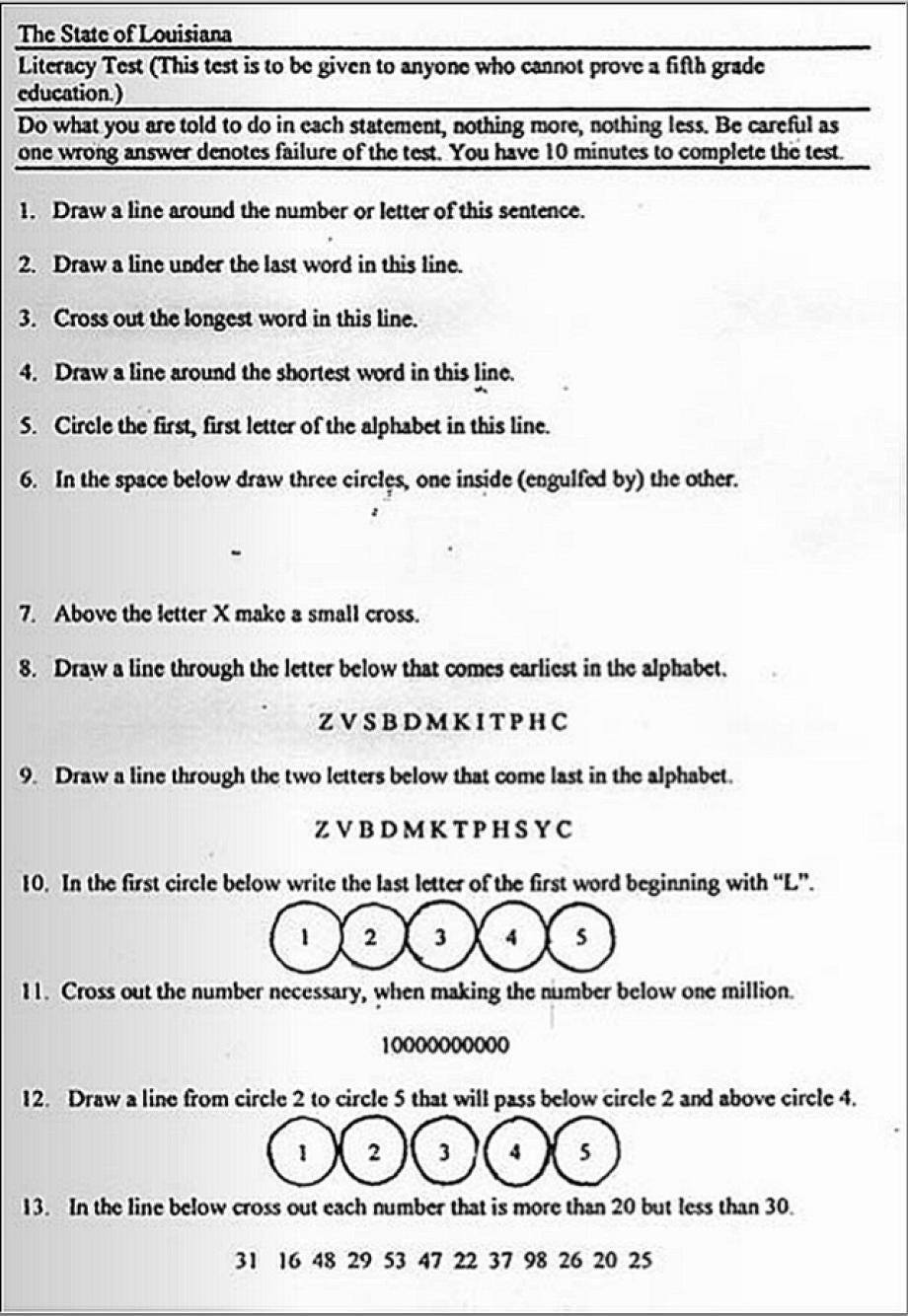The "Louisiana Literacy Test"
A history mystery is probably no mystery at all, just a campfire story.
A couple of days ago, the conservative commentator Lauren Chen posted a Slate article discussing infamous Louisiana literacy tests, supposedly given to black voters to stop them from voting. As the story goes, the test was designed to be as vague as possible so there was never any “real” answer key — instead, answers could be judged to be wrong or right based on an arbitrary whim from the registrar.
While I claimed that the test was real, I later did a bit more digging and concluded that the test probably did not exist, contrary to what everyone seems to think and what even I used to think.
Writing in Slate, Onion (2013) discusses how literacy tests — which were often just civic tests rather than ones measuring literacy — were used to disenfranchise minority voters from voting. Indeed, while there is a history of different states enacting literacy tests to stop non-whites from voting (Warren 2008: 375), one test purported to be used during these times is the Louisiana Literacy Test.
According to online blogs, the test was impossible to pass as the questions were designed to be as vague as possible so there could never be a “true” answer key. In other words, there existed no correct answer as the registrar could decide what the correct answer was arbitrarily. An example of such questions can be seen below, with the full test being available on The Internet Archive.
Countless articles have been written discussing this test (Annear 2014; Open Culture 2014; Mellon 2013), and people talking about and taking the test (NYTN 2023; Business Insider 2017; Buzzfeed 2017; Miller 2015; The Amazing Athiest 2015). I even remember hearing about it during my systems course in psychology during my undergraduate years. Indeed, the test has even made an appearance in academic books (e.g., Kamenetz 2015: 63; Fandl 2018; Marshall and Sensoy 2011; Hurt 2019).
However. there’s a big issue. Nobody has been able to verify if the test actually existed, or if it was even widely used as some online articles imply it to be. According to the Law Library of Lousianna,
At one time, a website dedicated to Civil Rights Movement Veterans displayed a "brain-twister" type literacy test that was used during the summer of 1964 in Tangipahoa Parish and possibly elsewhere in Louisiana. But they took it down. "We removed it from this website because it was not representative of the Louisiana tests in broad use during the 1950s and '60s." The link to the test is included here because the test has become famous, even though it was not widely used.
One of the few people who has been able to suggest the existence of this specific Lousianna literacy test is Jeffrey Schwartz, a member of the Congress of Racial Equality. According to Schwartz,
"Then the test - and how it was graded and administered - got even more insidious. Check out question 21. It says: "Spell backwards, forwards". If a Black person spelled "backwards" but omitted the comma, he/she would be flunked. If a Black person spelled "backwards," he/she would be flunked. If a Black person asked why, he/she would be told either "you forgot the comma," or "you shouldn't have included the comma," or "you should have spelled 'backwards, forwards'". Any plausible response by a white person would be accepted, and so would any implausible response” (in Jim Crow Museum)
Don Lemon claims to have seen the test in his 2021 book This Is the Fire: What I Say to My Friends About Racism (Lemon 2021). Though his recount is oddly short, little is said about the test and seems to rely verbatim on what the online versions of the test say. When information is given about the test, it repeats what other 2nd hand sources say about it, too.
According to the Civil Rights Movements Veterans website,
At one time we also displayed a "brain-twister" type literacy test with questions like "
Spell backwards, forwards" that may (or may not) have been used during the summer of 1964 in Tangipahoa Parish (and possibly elsewhere) in Louisiana. We removed it because we could not corroborate its authenticity, and in any case it was not representative of the Louisiana tests in broad use during the 1950s and '60s
According to Schwartz, he found the test online (the one in question) but it is not the one from 1960s. Instead, it was the closest he could find to the original test. But Hartford, another civil rights activist, claimed Schwartz re-created the test from memory. Two contrasting stories: One that it was re-created to be the one Schwartz saw, but also that it was found online and not the original one in question (MILLHOLLON 2013). As was said in the article:
The test, which asks the taker to “spell backwards, forwards” among other tasks, went viral on the Internet after it posted on a noted civil rights history website. The Tennessee State Archives put a copy in its collections. Teachers are using it in their history lessons. However, history experts in Louisiana do not have a copy of it.
“I suspected that was a hoax,” Andrew Salinas, reference archivist for the Amistad Research Center at Tulane University, said Wednesday.
So, not only could the test not be verified to be real, but contra the Law Library of Lousianna, the primary source they reference rather than link themselves also says that they could not verify its authenticity — and even if it did exist, it was not representative of the tests used; it is not saying the test had broad use only, rather that it could maybe not exist or if it did, it was not widely used as some people claim.
Even Onion (2013b) in an updated article could not verify if the test existed, instead being given the test by other educators who also assumed the test was real. A congressional record relating to literacy tests in Louisiana also failed to mention this specific literacy test, along with Spears-Bunton and Powell (2012) and Jost (2013)’s discussion on legal issues surrounding literacy tests in Louisiana, where all is mentioned is a civic test being banned, not the test under debate.
The earliest mention of one of the test questions of the supposed Louisiana Literacy test, at least from what I could find according to Google Books, was from the Official Publication of the State Bar of California Public Law Section · Volume 16. However, I can not find a full version online and Google provides a (literal) snippet of the publication. This is only for the “Spell backward, forwards” though. When more test questions are put through Google Books, they appear in a Chicago School publication from 1959, a 1938 book about directed learning. Given the original context where these questions were published, someone likely took a test designed to measure how good people were at reading and following instructions at a certain grade level, said it was a literacy test used during the Civil Rights era, and everyone rolled with it. The fact that no mention of this specific test is ever made in legal books, or any other serious books of American law and history cast doubt on the validity of this specific “literacy” test.
Given the lack of comprehensive information related to the test and the fact that most sources tend to repeat each other, along with contradicting testimony from individuals who claimed to have seen the test and others who have been unable to verify if it’s real, I would bet this test was a dud. Probably taken from a learning book, said it was a literacy test used for voting, and people rolled with it. While literacy tests did exist and were used for racist reasons, this particular test probably did not exist.




Literacy tests were just, righteous and should be reinstated